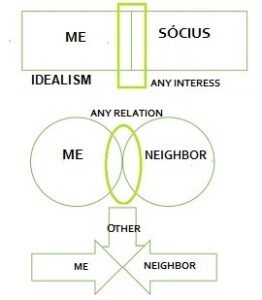
Posts Tagged ‘friendship’
Some fresh water and hot food
While the powerful fight for dominance, colonization and power ignore the lives of simple people, of basic service workers who are necessary in any country and culture because they have forgotten true community and moral values.
colonization and power ignore the lives of simple people, of basic service workers who are necessary in any country and culture because they have forgotten true community and moral values.
They can talk about this in everyday life, but their minds, articulations and efforts are focused on achievements and power, not the achievement of a good friendship, of a few hours of relief and pleasure in a day to day life and in a society that pushes us towards maximum efficiency and fatigue. to the limit of strength.
When hiring some construction service workers, they told me that they would like that in order to work they needed good fresh water and hot food, lunch boxes needed to be reheated and sweat was restored with simple fresh water.
They are also grateful for a dignified treatment and a little rest after lunch, it is incredible that a large part of the affluent society is unaware of these simple things that can bring great happiness, balance and peace, the tired society ignores this.
The centers of power are surrounded by ambitious people who know (or think they know) how to deceive simple people, but they are unaware of the day-to-day lives of these people.
I see when they form conversation circles, the issues and concerns, there are almost always concerns about relationships that are lost, the use of violence and chemicals that permeate their family life, as human values crumble and fall as well. upon them the worst degradations and inhumanities.
A good word, it is also a little fresh water now in a figurative sense, but no less true, true cultures and religions keep this “fresh water” in their thermal jugs and where the food of the soul can be digested and provide energy for everyday life. .
The biblical passage in which Jesus speaks to the crowds, and his family seeks him, he has a surprising answer Mt 12,49-50: “And stretching out his hand to the disciples, Jesus said: “Here are my mother and my brothers. whoever does the will of my Father who is in heaven is my brother, my sister and my mother” “, does not mean that he ignores his family, but he wants to give those people some good food and fresh water.
The world we live in is not ignored, in fact those in power ignore it, but its good to bring a little peace and hope to the souls that survive in a society of tiredness, hatred and neglect.
International Day of Friendship
The date of International Friendship Day was established by the UN to remember solidarity between peoples, respect for diversity and I make a special repost of content from this blog in this regard:
UN to remember solidarity between peoples, respect for diversity and I make a special repost of content from this blog in this regard:
The philosopher Plato defined friendship as “the reciprocal predisposition that makes
two beings equally jealous of each other’s happiness”, Augustine of Hippo affirmed that “being a friend merges us in the friendship of being; friends are one soul” and Aristotle seems to merge the two thoughts: “friendship is a soul with two bodies”.
It was Aristotle in Nicomachean Ethics dedicated two books to the study of philia and friendship, who defined friendship in three types: for interest, that for pleasure, for interest and true friendship, the first is easy to identify because it is the pursuit of mutual pleasure, the second because they are useful to each other, and the third, it is possible between good men because they desire good for its own sake and do not place pleasure or interest above friendship.
In chapter IXI the Peripatetic philosopher states:
“Perhaps we can say that there is nothing strange about breaking a friendship based on interest or pleasure when our friends no longer possess the attributes of being useful and pleasant; in fact we were friends with those attributes, and when they disappear it is reasonable not to continue in love. ” (Aristotle, IX, 3, 1165b) .
In the chapter “The partner and the neighbor” of the book “History and Truth” by Paul Ricoeur he will talk about the difference between these relationships, he talks about charity: “Charity doesn’t need to be where it appears; it is also hidden in the humble and abstract post office, the social security; it is often the hidden part of the social”, Paul Ricoeur, Le socius et le Prochain (1954).
We are reminded by the philosopher that just as institutions can only have corporate relationships, they can also have interpersonal relationships, of affection and solidarity and that make them less cold and less bureaucratic, where one sees not a client or a service more, but a neighbor in which one may be interested.
It is not by chance that it is a chapter of History and Truth, because the truth is only established between true and close friends, and if they are partners, it will only be to be closer.
The Twinkl website referenced this post in function of this date, thanks for the reminder.
Friendship and espirituality
Idealist philosophy places amgio and friendship in an ideal  philosophical relationship, Aristotle nevertheless warns: “the friend is made quickly, while friendship [is a fruit that matures slowly”, the same can be said of spirituality, recognizing that we have a part spiritual and that it is part human, requires an exercise in spirituality.
philosophical relationship, Aristotle nevertheless warns: “the friend is made quickly, while friendship [is a fruit that matures slowly”, the same can be said of spirituality, recognizing that we have a part spiritual and that it is part human, requires an exercise in spirituality.
It was Sloterdijk, one of the great thinkers of Germany today, who warned that we live in an “exercise society”, but warns that it is de-spiritualized.
High spirituality, before reaching the divine, must go through previous stages in the relationship with the Other, the one who is not a mirror, who does not have the same values as us and this relationship can evolve or obstruct, being more difficult when there is an obstruction to maintain a relationship of respect and cordiality, as friendship and love are more distant.
It is possible to love those who obstruct everything, yes, it is possible first to maintain respect, then separate what are values and real exercises in spirituality and what is just interest.
At this point, friendship has a very close relationship with the spiritual, it can be said that there is, in addition to friendship, reciprocity, a continuous flow of relationship between good people, what Aristotle defined as true friendship, for this you need good men.
There is no just society without just men, there are no friends without friendship exercises, and only on the basis of true reciprocity can friendship reach the spiritual level.
Only with good men can society be saved, says a curious biblical passage about Sodom (Gn 18,20-32) in which Abraham asks God if with a small number of just men society would be saved, and he reduces the number because he knows that there are few.
For those who believe the biblical verse, the teacher explains this question (Lk 1:5-8): “If one of you has a friend and goes to him at midnight and says to him, ‘Friend, lend me three loaves of bread, 6because a friend of mine has come on a trip and I have nothing to offer him,’ and if the other replies from within, ‘Don’t bother me! I have already locked the door, and my children and I are already in bed; I cannot get up to give you the loaves’; 8I tell you that even if the other does not get up to give them because he is your friend, he will get up at least because of his impertinence and give him whatever he needs.”
If one wants to achieve reciprocity, he must first take steps in respect and friendship, and the highest spirituality is to be able to love and respect enemies..
The idealistic concepts of friendship
We post that it is an exercise in rhetoric, but like any philosophy there is a seminal origin of a certain thought, Nietzsche starts from Platonic metaphysics stating that the game between friends of philosophy had a vice of conception that would be the will of truth, sometimes it was precisely she that there is a critique of the sophists relativizes it.
there is a seminal origin of a certain thought, Nietzsche starts from Platonic metaphysics stating that the game between friends of philosophy had a vice of conception that would be the will of truth, sometimes it was precisely she that there is a critique of the sophists relativizes it.
Based on this principle, Nietzsche will state that the philosopher must practice a certain “art of mistrust”, his main instrument being the hammer (Niettzsche in “Beyond Good and Evil”).
Deleuze states that Foucault would have declared that “Heidegger always fascinated him, but that he could only understand him through Nietzsche, with Nietzsche (and not the other way around)” (Deleuze, 1986, p. 120-121) and even though “surely , alongside Heidegger, but in a totally different way, the one who most profoundly renewed the image of thought” (Deleuze, 1990, p. 130-131).
Returning to the initial question, which is true friendship, after all if it is it and nothing else that allows for a broad relationship between the various concepts of friends in philosophy, being itself by definition (philo-friend) sophia (wisdom).
This is how Deleuze and Guattari develop the question of friendship, considering the different thinkers, the friend is for him, being more textual, it is a “trait of conceptual character” that has to do with “psychosocial characters” (Deleuze, Guattari, 1991, p. .68)
As we said, it is an emptying of the concept of friend, transformed into an object of subjective reflection, for this reason we say that they are idealist concepts, even when approaching clearly non-idealist authors such as Heidegger and Nietzsche.
We return to the Aristotelian concept that differentiates friendship for pleasure or for utility from true friendship and therefore the question of truth is essential, and even Plato considered it, although it divides the world of ideas (eidos for the Greeks) and the sensible world.
Also the concept of neighbor (one who is within a broad affection of friendship) and the partner (one to whom we associate ourselves for a certain happiness), concepts of Paul Ricoeur are essential points in our view for the reflection on friendship.
DELEUZE, Gilles. Pourparlers Paris: Minuit, 1990.
DELEUZE, Gilles; GUATTARI, Félix. Qu’est-ce que la philosophie? Paris: Minuit, 1991.
Friendship and concepts
We have already posted and explored the concepts of friendship in Aristotle for pleasure, for interest and true friendships, we also highlight the difference between the partner and the neighbor (Paul Ricoeur’s text) where in the first case there is only interest and once the friendship is over closes or diminishes.
in Aristotle for pleasure, for interest and true friendships, we also highlight the difference between the partner and the neighbor (Paul Ricoeur’s text) where in the first case there is only interest and once the friendship is over closes or diminishes.
What we want to explore a little bit now is what it means in an individualistic world and where interest reigns, what is the concepts of friendship and friend.
In another perspective, in which Deleuze and Guattari go so far as to say that the friend and friendship are “absent” concerns in philosophical thought, and the book “A friendship de Maurice Blachot” is mentioned as a rare exception, but there is already at the base of this discourse a clear distinction between friend and friendship.
So the philosopher is a “friend” of wisdom (philos-friend and sophia-wisdom), but there is a compulsory obligation due to “friendship” being the object of this relationship, and thus only these friends could participate in the friendship, that is, there is a requirement of wisdom.
The basis of this concept is in the “gaze” of a so-called “sage”, so they are concepts within each one, they are the eyes or look of each one on another person, but this look is a sensation that does not come from the eyes of the senses or of personal feelings, so they are a nobody’s gaze, a demand for observation, a selfie that must be seen by another.
But how can you be a friend while being nobody? This question makes more sense when it comes to a dimension in a highly differentiable plane, and thus it can be seen in certain historical, political and even religious contexts, where each thinker is taken individually as having a “look” of sage, or of pretended wisdom.
One can illustrate with Guattari and Deleuze himself, and thus we can divide friendship into concepts of different contexts: the Greek, the Nietzschean, the Heideggerian and the Focaultian.
Such an inquiry aims to explore the territory of friendship as a concept, because if, as we said, it is a highly differentiable dimension or plane, then it can be detected in certain historical periods or even in each thinker taken individually. We will then try to define and illustrate, from the elements that we have just lent to Deleuze and Guattari, in a way appropriate to the extension of this article, four types of friendship of the concept, the Greek, the Nietzschean, the Heideggerian and the Foucaultian, but it’s just a rhetorical exercise.
It can be worthwhile as an exercise in thought, friendship is simple and there can be, and there are, among simple people with little book culture, and there may not be among “cults”.
I venture to say that there is more true friendship between simple people, than Heidegger says in his Forest Path in which he lives with very simple people.

